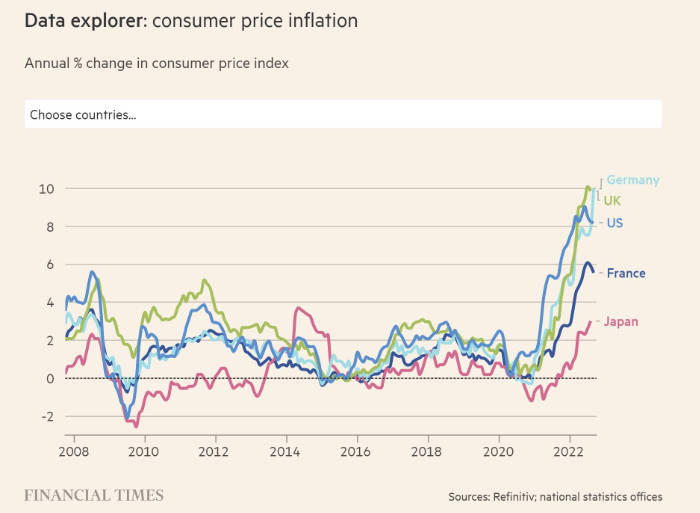In short:
- US inflation rose 0.4% in September; COLA will increase by 8.7% in 2023.
- Current floods in Southeast Australia might cause food shortages and high food prices.
- A chronic shortage of AdBlue could damage Germany’s supply chain and economy.
US inflation rose 0.4% in September; Supply chain issues affecting Adderall, butter, tomatoes, beer, and more; Drought threatens England’s food supply chain
The latest Consumer Price Index report showed that US inflation increased by 0.4% in September. Shelter, food, and medical care were the biggest contributors. As a result of higher inflation, social security recipients will receive an 8.7 % increase in their benefits beginning January 2023. Rent prices seem to be cooling down, but the slowdown might not register in the data for a while.
Inflation has been soaring everywhere. The article has various interactive graphs you can play with:

Biden signed an executive order directing HHS to find ways to lower prescription drug costs. Community member Rebecca recently suggested using CostPlus Drugs to find cheaper prescriptions. Do you have any other suggestions for finding more affordable medications? Feel free to comment below or on Discord.
Student loan forgiveness applications are now open. The application deadline is Dec 31, 2022.
Hurricane Ian estimated insurance losses are $75B, making it the costliest natural disaster ever in nominal terms, according to FT. Billions of other losses will be borne by the US federal government’s National Flood Insurance Program and Florida’s Citizens Property Insurance Corporation. What to prepare for: A deterioration of Florida’s insurance marketplace resulting in higher premiums or a flat-out decline in coverage (paywall).
Here’s a list of current food shortages and/or high prices: butter, beer, ketchup, baby formula, sriracha, tampons, popcorn, wheat products, pet food, turkey, mustard, AdBlue (Germany) peaches, Halloween candy, tomatoes, and champagne. There is also a national Adderall shortage.
Drought threatens England’s fruit and vegetable crops next year. Leaked slides from a national drought group meeting show concerns that the fruit and vegetable supply chain could collapse because reservoirs are still empty. Millions in London and Oxfordshire could be placed under severe restrictions in the coming months.
Here are some basic things you can do to prepare for supply chain disruptions (from an older blog post):
- Stock up on essentials: food, water, medicine, personal hygiene items, etc.
- Invest in longer-term necessities like generators and gasoline.
- Contact local food and other goods producers to localize your supply chain.
- Start producing your food and goods as much as possible. Even if you can only do a little bit, the important thing is to practice for when times get tough. A little balcony garden could help alleviate food shortages while helping with high food costs.
Short-term supply chain preps:
- Go Christmas shopping now: You could score significant discounts this year.
- Prepare for Thanksgiving now: Many Thanksgiving staples, like bread crumbs, boxed stuffing, canned cranberry sauce, frozen turkeys, and butter (on the shortage list, alongside turkey), keep well.
- Stock your pantry: While doing your early Thanksgiving shopping, stock up on shelf-stable foods that your family likes to eat. Rice and beans are a great staple, as are canned vegetables. See our supermarket survival pantry guide for more ideas. And here are great ideas on what to cook using only non-perishable food.
- Store water: Invest in water storage containers and keep a supply of drinking water on hand.
- Take care of medical needs: Stock up on medical supplies and essential medications. An individual first-aid kit is a must. but consider your daily needs. If you’re taking prescriptions, talk to your doctor and insurance company about getting prescription medicines in bulk. If you depend on a medical device like a CPAP machine, ensure you have spare parts or maybe even an entire spare machine.
Keep reading here for medium, and long-term supply chain preps suggestions.
Pediatric respiratory illnesses, Covid, flu on the rise; California on alert for Ebola (no infections); OTC hearing aids
There is a spike in hospitalizations for respiratory illnesses like RSV, enteroviruses, and rhinovirus (common cold) in US children. Respiratory infections typically surge in the winter, but this year’s season started much earlier, and the numbers are unusually high. For now, the problem is concentrated among younger children, but with colder months coming up, more people could be affected. Parents should contact a healthcare provider immediately if they or their child have trouble breathing, a sudden onset of limb weakness, or if symptoms worsen (breathing difficulties, throwing up, inability to eat or drink).
Signs are pointing to an early start for flu season, with cases already ticking up in the southeast and south-central areas of the US. A flu outbreak likely sickened hundreds of students at a high school in San Diego.
The CDC expanded the use of bivalent boosters for everyone five and up. Early data on bivalent boosters showed a “substantial increase” in neutralizing antibodies and should provide reasonable protection against currently circulating variants. In anticipation of a spike in cases, the US extended the Covid public health emergency until Jan 11.
Uganda announced lockdowns to try to prevent the spread of Ebola. No cases have been found in the US, but California doctors have been told to be on alert. Ebola mainly spreads through bodily fluids and is usually not contagious until symptoms appear (including fever, headache, muscle and joint pain, fatigue, loss of appetite, gastrointestinal symptoms, and unexplained bleeding). It can take 2-21 days for the first symptoms to begin. There is no cure, and no vaccine exists (although there should be a couple of trials starting soon).
Hearing aids are now available over the counter for as low as $199 and without a prescription. The over-the-counter aids are intended for adults with mild to moderate hearing loss.
Australian floods will last for weeks and could cause food shortages; Heat broke records and caused fires in the Northwest
Torrential rain is causing devasting floods on Australia’s east coast. More than 11,000 were displaced, and over 40,000 homes could be flooded or isolated. Officials are warning to expect consecutive flood peaks, separated by receding waters, “as different river systems come together.” Some Victorian farmers are isolated and without power, and officials worry the flooding could cause food shortages and high food prices. This weather system is expected to last for the next six-eight weeks.
Floods in Victoria are uncommon. Here’s why they’re happening now – and how they compare to the past.
Seattle was 88 F (31 C) on Sunday, breaking the record for the hottest temperature this late in the year. Heat-driven wildfires threatened the evacuation of 40,000 homes and sent smoke into Puget Sound. More records in the Northwest:
A staggering amount of heat-related records have been shattered across the Northwest so far this month, which is leading to some unwanted consequences. https://t.co/qmuMYKff0r pic.twitter.com/8pTzbz9lvF
— Breaking Weather by AccuWeather (@breakingweather) October 17, 2022
Preppers in Paradise; Svalbard; Ban on guns with serial numbers removed is unconstitutional, more gun laws and demographics
A Booking.com research on 2023 travel trends shows that 59% want to use travel as an opportunity to learn survival skills and 40% to prepare for an apocalypse. It’s literally their n.1 trend, titled “Preppers in Paradise.”
Iraq and Uruguay deposited crop seeds at the Arctic doomsday vault for the first time last week. Thirteen gene banks from Asia, Australia, Europe, and Latin America have deposited more than 45,000 seed samples. The vault was put to good use in 2015 when the International Center for Agricultural Research in Dry Areas (ICARDA) used withdrawn seeds to rebuild its seed collections damaged during the war in Syria. The vault is opened only three times a year to limit its seeds’ exposure to the outside world.
A federal judge ruled that the ban on guns with serial numbers removed is unconstitutional. And in Tennesse, public housing agencies can no longer bar tenants from having guns in their homes.
While we are in the firearms theme, here’s a neat photo story of “the faces of the rising number of Black gun owners in the US.” Nice to see more about gun demographics and responsible gun ownership normalized in the media.
If you have ever thought about a firearm for protection, here is our beginner’s guide to guns. Alternatively, our review of the best air rifles.

You are reporting the comment """ by on